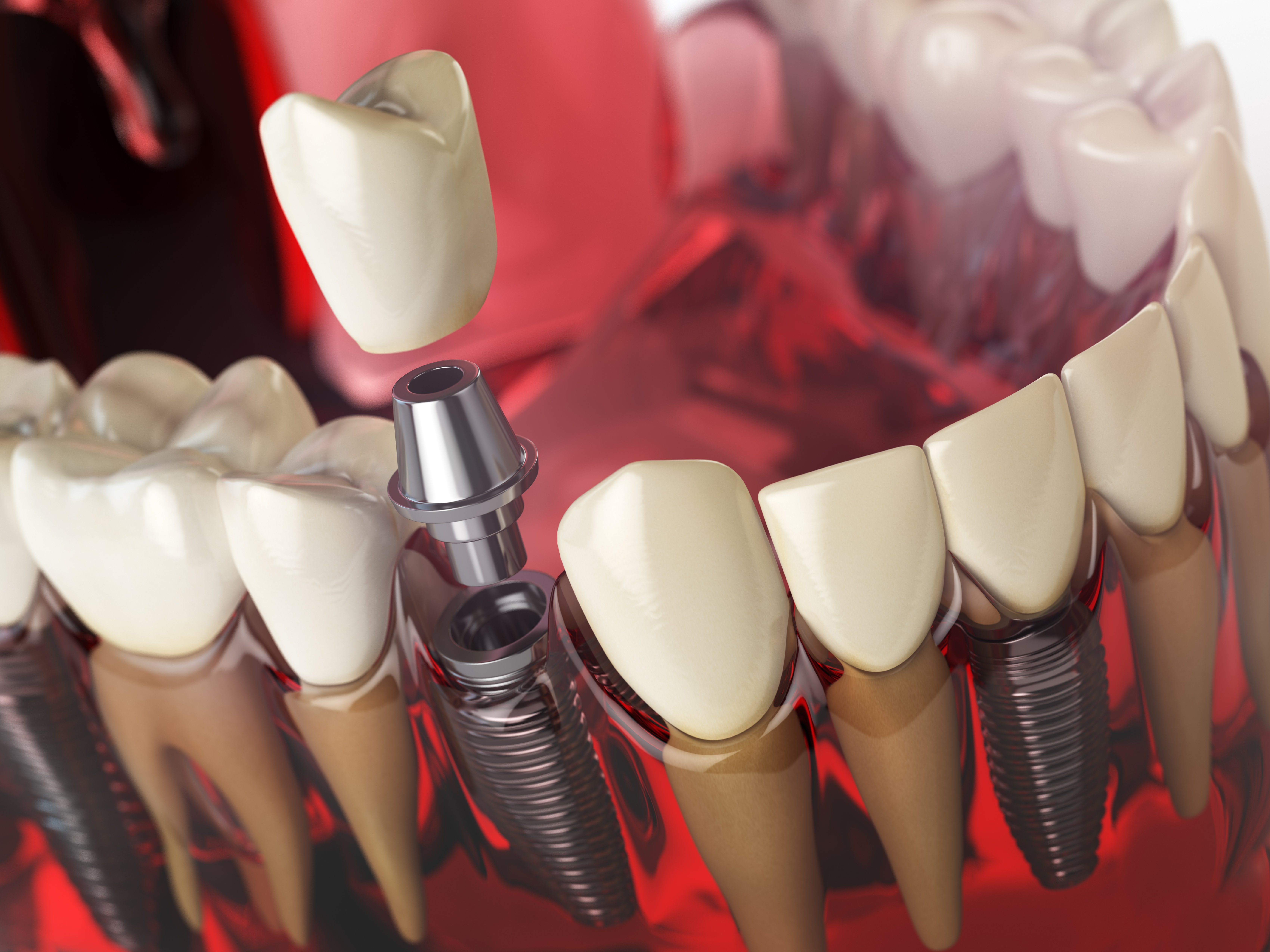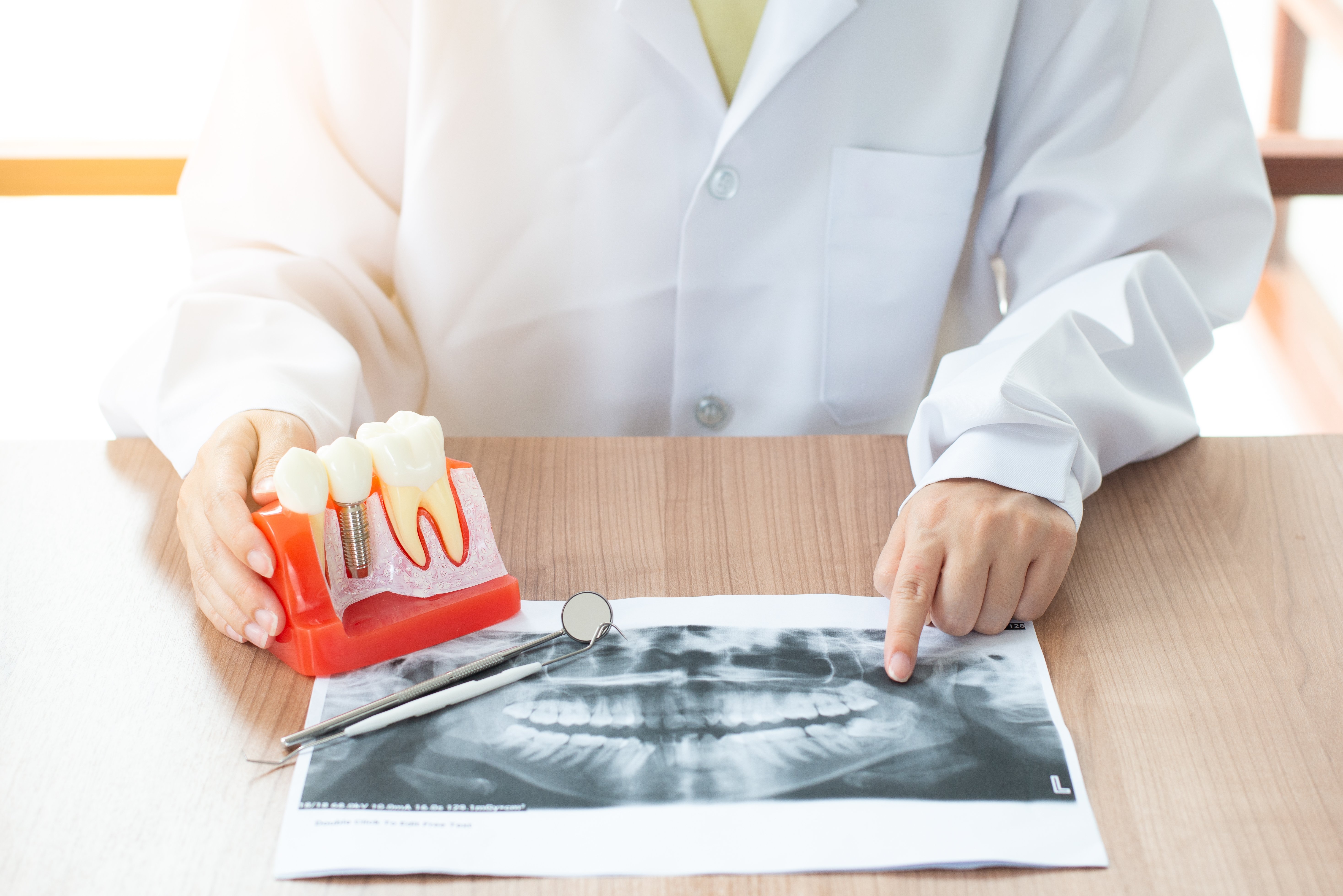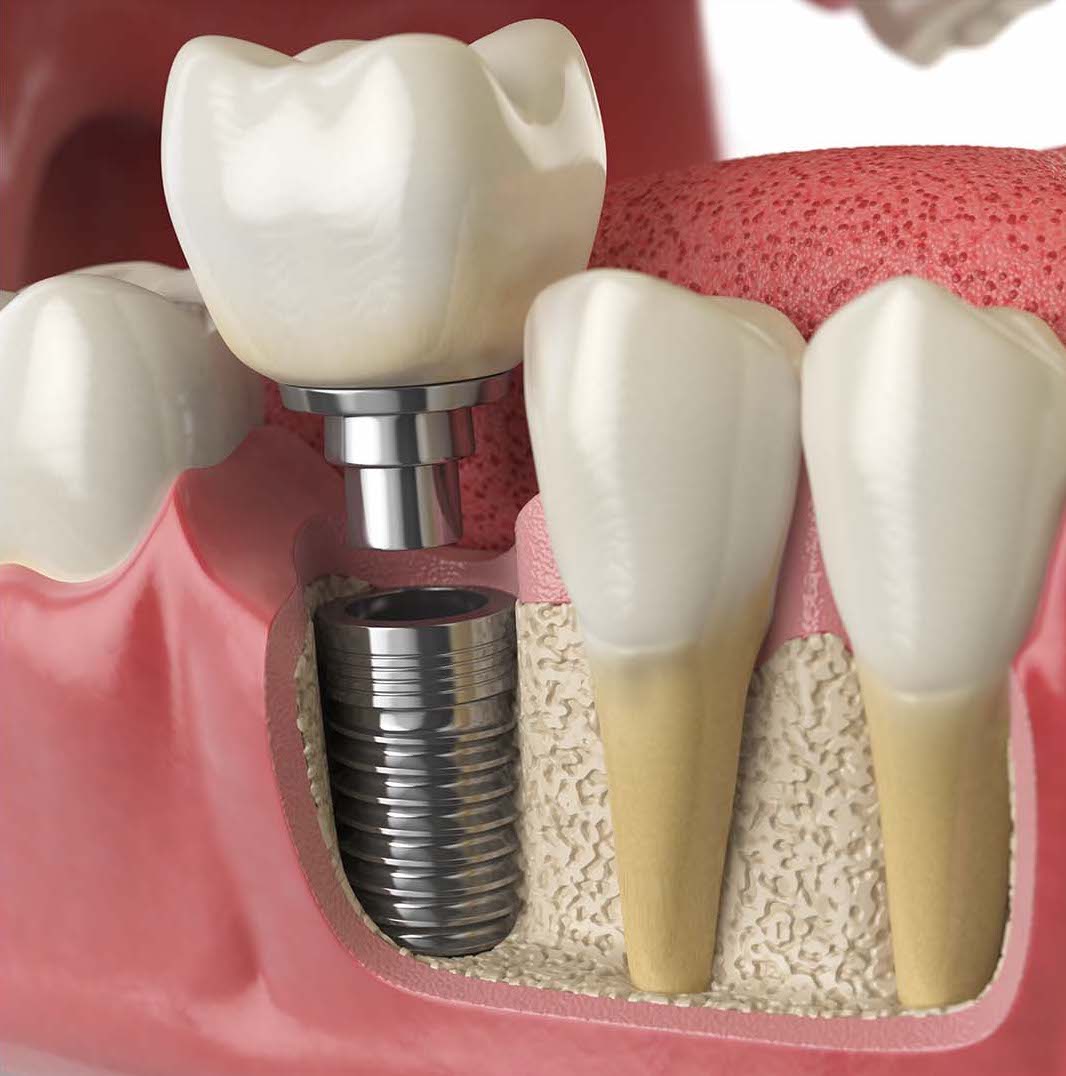What is a dental implant?
A dental implant/tooth implant consists of a small screw made of titanium that is placed in the jaw. A dental implant replaces the root of a missing tooth/teeth and hence serves as a sound base for the novel crown or bridge.
After the surgical phase of treatment, the prosthetic (crown/ bridge) phase begins: a replacement tooth/teeth in the form of a crown, bridge or denture, is placed over the implant. This completes your entire dental implant process.
Why should I have dental implants?
.jpg?width=5000&name=3d-dental-tooth-implant-K8W7QWP%20(1).jpg) Dental implants/ tooth implants are used to support crowns, bridges or over-dentures. The evidence is clear that dental implants/ tooth implants are stellar substitutes for missing natural teeth, whether it is a single tooth or multiple missing teeth. We know from recent long-term studies that root-form dental implants are known to have very high success rates in the long term. With digital dental capabilities in dental implant treatment, dental implants have become the benchmark for the replacement of missing teeth.
Dental implants/ tooth implants are used to support crowns, bridges or over-dentures. The evidence is clear that dental implants/ tooth implants are stellar substitutes for missing natural teeth, whether it is a single tooth or multiple missing teeth. We know from recent long-term studies that root-form dental implants are known to have very high success rates in the long term. With digital dental capabilities in dental implant treatment, dental implants have become the benchmark for the replacement of missing teeth.
Am I suitable for dental implants?
Patients who are able to undergo a routine dental extraction should largely be fit enough for a dental implant to be placed. In growing children, dental implants might not be suitable as their alveolar/ jaw bone is still developing.
There is no upper age limit for dental implant treatment for healthy adults. For patients with existing chronic gum disease or systemic diseases, we will work with you and your medical doctor to achieve proper disease control prior to commencing dental implant treatment.
Smoking is a known factor which can compromise the success of dental implant treatment. Many studies have clearly proven a causal relationship to poor wound healing and poor “osseointegration/ jaw bone healing to the implants” in, especially regular smokers.
Some patients who have lost their teeth for many years may experience significant alveolar/jaw bone loss. Such patients will often require implant site preparation with bone grafts or sinus lifts to ensure that adequate bone volume is present prior to implant placement.
What are the benefits of dental implants?
.jpg?width=3603&name=doctor-dentist-explain-the-implant-of-teeth-to-pat-QNUFDQE%20(1).jpg) Dental implants eliminate the need for adjacent teeth preparation associated with traditional teeth replacement options using fixed bridges or removable dentures. Loss of teeth can result in changes in facial appearance and especially lip support. With dental implants, missing teeth can be replaced and allow us to maintain our facial appearance and smile (age gracefully). Incidentally, dental implants also help maintain alveolar bone (jaw bone) thickness. Hence this means that implants will work together with your remaining teeth and maintain a healthy and confident smile and ensure efficient functionality when you eat.
Dental implants eliminate the need for adjacent teeth preparation associated with traditional teeth replacement options using fixed bridges or removable dentures. Loss of teeth can result in changes in facial appearance and especially lip support. With dental implants, missing teeth can be replaced and allow us to maintain our facial appearance and smile (age gracefully). Incidentally, dental implants also help maintain alveolar bone (jaw bone) thickness. Hence this means that implants will work together with your remaining teeth and maintain a healthy and confident smile and ensure efficient functionality when you eat.
Comfort and Convenience
Dental implants are held in place by the jaw bone. This means that denture wearers who are concerned about dentures that fall out or for those who cannot tolerate plastic in their mouth now finally have an option to make changes to their quality and comfort in eating. This eliminates inconveniences, discomfort and embarrassment associated with removable dentures, allowing patients to live a normal lifestyle as they should be.
Long lifespan
Dental implants have demonstrated good survival rates in patients who strive towards a joint responsibility when working with their dentists to keep their incidence of gum disease low. In many long-term studies, we note that implants are certainly comparable or high-ranking to other forms of teeth replacement. Furthermore, recent results published internationally on the topic of long-term dental implant/tooth implant survival rate and success rates of dental implants appear to be favourable.
What are the types of dental implants and methods available?
 Our dental implant dentists perform both conventional and immediate dental implants.
Our dental implant dentists perform both conventional and immediate dental implants.
This includes Single Tooth implant, Full Arch Teeth Implants, All on 4, Same Day Teeth, Conventional (Regular) Tooth Implants & Mini Dental Implant. In selected cases, immediate loading dental implants (immediately after extraction) may be possible.
Is anesthesia required?
All surgical services at Nuffield Dental Jewel can be performed under Local Anaesthesia, General Anaesthesia or intravenous sedation (as requested by nervous patients).
What are the costs involved?
With over 20 years of experience, we are ready to help you with any of your dental needs. If you would like to undergo an assessment for an implant procedure, do not hesitate to call us for pricing details or to book an appointment.
Please click here to download Dental implants post-op instructions.
Why choose Nuffield Dental Jewel for this treatment?
 Considerable proficiency and training for the dental professional are paramount to the success of dental implants/ tooth implants.
Considerable proficiency and training for the dental professional are paramount to the success of dental implants/ tooth implants.
The dentists at our clinic have been involved in implant dentistry and oral surgery for 20+ years. This difference will be noticed by you when you meet them. For patients who require complex dental treatment for their oral conditions, we have senior dentists who are focused and dedicated to advanced implant reconstruction for your convenience.


